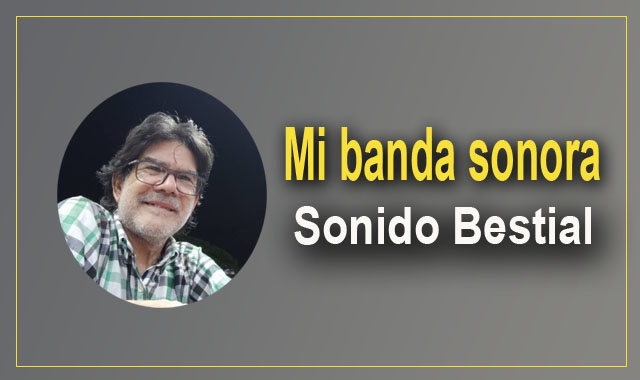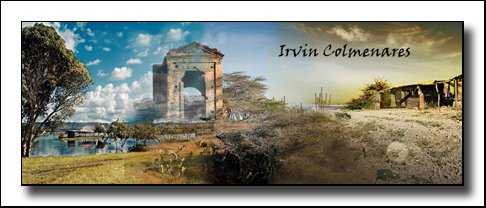Mi banda sonora: Sonido bestial | My soundtrack: Beastly sound

Para el año sesenta y ocho mi abuela estaba a punto de estrenar casa en la Guaira. Hasta ese momento habíamos tenido una vida bastante errante, la abuela se mudaba con mucha frecuencia. Vivimos en muchos sitios, primero en varias partes de Caracas y luego en algunas zonas de la Guaira. Hasta donde recuerdo vivimos un tiempo en Maiquetía, Punta de Mulatos, Macuto y Naiguatá.
Pero algo cambió en las finanzas familiares y comenzaron a construir una casa en una zona del Palmar Este, cerca de donde estuvo hasta antes del deslave la famosa playa Lido, sitio de encuentro de mucha gente de la capital. La casa estaba situada en la frontera donde terminaban las urbanizaciones y comenzaba la montaña. El sitio se llamaba Corapal.
Por esas casualidades de la vida, a pocos metros de donde la abuela construía su casa estaban levantando una enorme estructura de dos pisos que ocupaba la mitad de la manzana. Primero terminaron la casa de la abuela y a los pocos meses la otra construcción.
El dueño de aquella construcción era un señor portugués que vivía con su hijo como de diez años. Nunca nadie supo qué pasó con la madre del niño. Aquel muchacho debía haber nacido en Venezuela ya que hablaba sin ningún tipo de acento y en más de una oportunidad le servía de interprete a su padre que no entendía algunas palabras en español.
El portugués y su hijo vivían en la parte de arriba del pequeño edificio, donde también habían dos departamentos más que alquilaban ocasionalmente. En la parte de abajo habían separado dos ambientes, en el más pequeño comenzó a funcionar una bodega y el otro se mantuvo un tiempo sin ningún uso.
Pero un buen día el portugués comenzó a acondicionar el local al lado de la bodega. Trajeron un montón de mesas y sillas, y algo que nadie se esperaba: una rockola, de esas que montaban pequeños discos de 45 rpm. El espacio se había convertido en el único bar que conocería la zona.
Aquel bar inmediatamente se hizo popular, los hombres del barrio comenzaron a visitarlo con frecuencia, lo atendían el portugués y un empleado, y nunca hubo meseras. El portugués era muy celoso de que los niños no entráramos al bar, a pesar de que allí no veríamos algo distinto que a unos cuantos hombres jugando dominó y tomando cervezas.
No sé quién sería el asesor musical del bar pero era el único sitio donde yo escuchaba música de salsa. En mi casa no había equipo de sonido y tanto mi madre como mi abuela solo usaban la radio para sintonizar las novelas y los noticieros.
Estoy completamente seguro que fue en ese bar donde escuché por primera vez el extraordinario sonido de dos gigantes de la música latina, Richie Ray y Bobby Cruz.Pasaría mucho tiempo hasta que yo supiera que aquellas canciones que me parecían tan potentes llevaban nombres como el Jala, Jala o Mr. Trumpet Man.
También es muy probable que años más tarde, cuando ya yo estaba a punto de terminar el bachillerato, allá por el año 71, escuchara en el bar frente a la abuela la canción que les comparto hoy: Sonido bestial, de los mismos autores.

Gracias al internet he podido conocer algunos datos de la canción que me eran muy difíciles de saber por aquellos tiempos juveniles.
La canción tiene su historia, surge en un momento en que Richie Ray y Bobby Cruz deciden abandonar la escena neoyorquina para instalarse en Puerto Rico.
Cuenta la leyenda que el motivo de aquella decisión, que a todos luces parecía un poco descabellada, puesto que el mercado neoyorquino era el más grande del mundo para los músicos latinos , se debió a problemas personales de Bobby Cruz. Al parecer el cantante se había implicado en problemas con gente del bajo mundo y decidió poner distancia mientras se enfriara la situación.
El caso es que contra todos los pronósticos aquella mudanza para Puerto Rico no afectó en nada la popularidad y el empuje musical de aquellos colosos.
Es por eso que en los primeros versos de Sonido Bestial se les habla a los que dudaban de su éxito.
El video que les dejo tiene la letra en forma de animación, si la siguen se van a dar cuenta que la canción tiene cierto tono jocoso. Cuando Richie Ray, extraordinario pianista con una gran formación musical, produce un cambio de registro para introducir acordes de música clásica, el cantante se sorprende y pregunta de qué va eso. También van a encontrar algunas imprecisiones porque Bobby Cruz dice que los acordes pertenecen a alguna composición de Stravinsky, cuando en realidad son pasajes de Chopin.
Y ese es uno de los grandes méritos de esta canción, la libertad con que la compusieron . Los autores no tuvieron temor en incorporar pasajes de música clásica en una pieza como esta. También es de destacar el excelente trabajo de percusión que se puede apreciar en diferentes momentos de esta maravillosa pieza musical.
Es muy probable que la gran mayoría de ustedes conozcan este tema, pero si no es así los invito a que le presten atención, quizá hasta les provoque mover los pies.
Gracias por tu tiempo.


By 1968, my grandmother was about to move into a new house in La Guaira. Until then, we had led a rather nomadic life, as my grandmother moved around a lot. We lived in many places, first in various parts of Caracas and then in some areas of La Guaira. As far as I can remember, we lived for a time in Maiquetía, Punta de Mulatos, Macuto, and Naiguatá.
But something changed in the family finances, and they began to build a house in an area of Palmar Este, near where the famous Lido beach, a meeting place for many people from the capital, had been before the landslide. The house was located on the border where the urban developments ended and the mountains began. The place was called Corapal.
By one of those coincidences in life, a few meters from where my grandmother was building her house, a huge two-story structure was being built that took up half the block. First, my grandmother's house was finished, and a few months later, the other building.
The owner of that building was a Portuguese man who lived with his son, who was about ten years old. No one ever knew what happened to the boy's mother. The boy must have been born in Venezuela, as he spoke without any accent and on more than one occasion served as an interpreter for his father, who did not understand some Spanish words.
The Portuguese man and his son lived on the top floor of the small building, where there were also two other apartments that they rented out occasionally. On the ground floor, they had divided the space into two rooms. The smaller one was used as a storage room, while the other remained unused for some time.
But one fine day, the Portuguese man began to refurbish the premises next to the wine cellar. They brought in a lot of tables and chairs, and something no one expected: a jukebox, one of those that played small 45 rpm records. The space had become the only bar in the area.
That bar immediately became popular, the men in the neighborhood began to visit it frequently, it was run by the Portuguese man and an employee, and there were never any waitresses. The Portuguese man was very strict about not letting children into the bar, even though there was nothing to see there except a few men playing dominoes and drinking beer.
I don't know who the bar's music advisor was, but it was the only place where I listened to salsa music. There was no stereo at my house, and both my mother and grandmother only used the radio to tune in to soap operas and news programs.
I am absolutely certain that it was in that bar where I first heard the extraordinary sound of two giants of Latin music, Richie Ray and Bobby Cruz. It would be a long time before I learned that those songs that seemed so powerful to me had names like Jala, Jala or Mr. Trumpet Man.
It is also very likely that years later, when I was about to finish high school, back in 1971, I heard the song I am sharing with you today in the bar in front of my grandmother: Sonido bestial, by the same authors.

Thanks to the internet, I have been able to find out some facts about the song that were very difficult for me to know in my youth.
The song has its own story, emerging at a time when Richie Ray and Bobby Cruz decided to leave the New York scene and settle in Puerto Rico.
Legend has it that the reason for that decision, which seemed a little crazy since the New York market was the largest in the world for Latin musicians, was due to Bobby Cruz's personal problems. Apparently, the singer had gotten involved with some shady characters and decided to distance himself while the situation cooled down.
The fact is that, against all odds, that move to Puerto Rico did not affect the popularity and musical drive of those giants in any way.
That is why the first verses of Sonido Bestial are addressed to those who doubted their success.
The video I am sharing with you has the lyrics in animated form. If you follow them, you will realize that the song has a certain humorous tone. When Richie Ray, an extraordinary pianist with a great musical background, changes the register to introduce classical music chords, the singer is surprised and asks what that's all about. You'll also find some inaccuracies because Bobby Cruz says that the chords belong to a composition by Stravinsky, when in fact they are passages by Chopin.
And that is one of the great merits of this song, the freedom with which it was composed. The authors were not afraid to incorporate passages of classical music into a piece like this. Also noteworthy is the excellent percussion work that can be appreciated at different moments in this wonderful piece of music.
It is very likely that most of you are familiar with this song, but if not, I invite you to listen to it, it might even make you want to tap your feet.
Thank you for your time.
Translated with DeepL.com (free version).








Comunidad Be Entrepreneur

¡Hola!
De la música en cuestión no me acuerdo, pero en el año 71, cada domingo íbamos al balneario de playa Lido, donde aprendí a nadar.
Feliz día.
Era una playa muy bonita. A nosotros nos gustaba nadar del lado afuera del malecón. Lamentablemente el deslave acabó con todo ese pedazo de costa. Gracias por pasar y comentar estimado @felixmarranz. Un fuerte abrazo desde Maracay.
Sí que lo era, yo a lo sumo llegaba a hasta la guaya y me devolvía. Muchas cosas han pasado desde entonces.
Un abrazo desde Buenos Aires.
¡Felicidades! Esta publicación obtuvo upvote y fue compartido por @la-colmena, un proyecto de Curación Manual para la comunidad hispana de Hive que cuenta con el respaldo de @curie.
Si te gusta el trabajo que hacemos, te invitamos a darle tu voto a este comentario y a votar como testigo por La Colmena.
Si quieres saber más sobre nuestro proyecto, te invitamos a acompañarnos en nuestro servidor de Discord.
Muchas gracias por el apoyo estimados amigos.
Do you want to get involved? Do you want to support music and this project? Follow us to keep you updated and read our Introduction post!
🎶 Join us on our Discord Server! 🎵
Thank you so much.
Congratulations @irvinc! You have completed the following achievement on the Hive blockchain And have been rewarded with New badge(s)
Your next target is to reach 76000 upvotes.
You can view your badges on your board and compare yourself to others in the Ranking
If you no longer want to receive notifications, reply to this comment with the word
STOPRecordar es vivir...A bailar amigo @irvinc